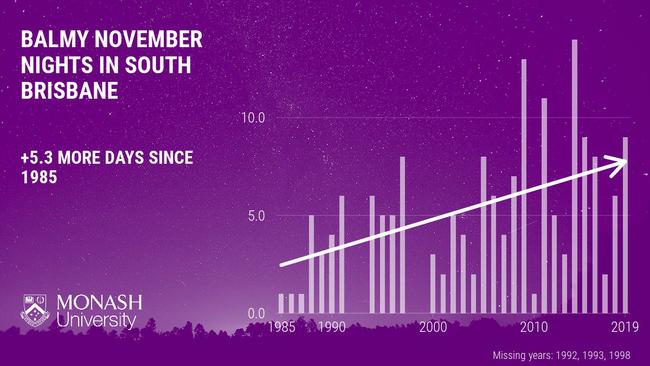More hot temperatures for the southern suburbs including Redlands, Highgate Hill and West End.
Dr Christa Pudmenzky discusses south Brisbane's forecast and warming night temperatures. Plus insights from local parent Kate on changes in the climate.

HyperLocal
Don't miss out on the headlines from HyperLocal. Followed categories will be added to My News.
More sunshine is forecast for south Brisbane this weekend, reaching a top of 31 degrees on Sunday for this year's Brisbane Blast.
UV ratings are high so be sure to slip slop slap.
Daytime temperatures are not the only things heating up this time of year.
Compared to 35 years ago, south Brisbane now averages around five more balmy November nights reaching at least 20 degrees.
Back in 1985 there was only one November night that reached 20 degrees, but last year there were nine.
Scientists say this significant increase in balmy November nights is consistent with warming trends across southeast Queensland.
Did you know?
Across the world, nights are warming faster than days.
This shows that rising temperatures are not caused by changes in sun activity.
If warming was caused by an increase in the Sun's energy, we would see a faster rise in daytime temperatures, rather than night-time temperatures.
Warmer nights can affect the quality of our sleep, making it harder to fall asleep and stay asleep when temperatures are higher.
Voices from your community
The nights aren't the only things heating up, thinks Chelmer parent Kate.
"We get more hot days and nights and it's much drier, rainfall has declined," she said.
"We have planted a lot of shrubs and maintain high tree cover in our yard as this assists with keeping the house cooler."
Kate volunteers at her local community garden.
"I've noticed much fewer insects, butterflies and bees, and fewer fruit bats as there is less food," she said.
"We see native birds such as honeyeaters less frequently, and fewer kookaburras.
"It's very dry, the grass is brown on sports fields and in parks with little shade."
Community voices like Kate's tell us how residents and business owners in Brisbane feel about their local climate. If you would like to contribute your voice to our column, you can fill out our 5-minute survey here.
Dr Christa Pudmenzky is a climate scientist at the University of Southern Queensland.
This column is part of a collaboration between Monash University and News Corp to deliver hyperlocal weather and climate information.
Questions? You can email us at mcccrh@monash.edu
